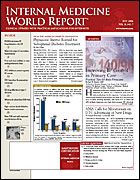Statins Confer Added Benefits to Antihypertensive Therapy
NEW YORK CITY—New data demonstrate that use of statin therapy reduces cardiovascular (CV) morbidity and mortality among hypertensive patients receiving antihypertensive medications, meaning it has an additive effect to standard hypertensive therapy.
The information presented at the 21st annual scientific meeting of the American Society of Hypertension was based on a meta-analysis of nearly 70,000 patients who had been enrolled in placebo-controlled, randomized trials that examined the effects of statins on CV morbidity and mortality in adults with and without CV disease.
“Our findings suggest that statins constitute an integral part of the management of overall cardiovascular risk in hypertensive patients with additional risk factors,” said Franz Messerli, MD, head of the Hypertension Section at St. Luke’s– Roosevelt Hospital Center, New York City.
“Our findings suggest that statins constitute an integral part of the management of overall cardiovascular risk in hypertensive patients with additional risk factors.” —Franz Messerli, MD
“There is considerable evidence that raised blood pressure and dyslipidemia are interrelated metabolically, epidemiologically, and clinically,” he explained. “Furthermore, hypertension and dyslipidemia are major risk factors for coronary heart disease [CHD], and the role of statins in lowering lipids and preventing major cardiovascular sequelae has been established.”
In the Goteborg primary prevention trial, blood pressure (BP) and cholesterol had to be reduced before the incidence of CV disease could be substantially decreased. When cholesterol levels remained unchanged, lowering BP offered only modest benefits. Recent guidelines recommend an integrated approach to reducing overall CV risk that includes management of BP, lipids, and other CV risk factors.
Lancet
JAMA
Until now, only 2 broad-based studies have assessed the effects of statins in hypertensive patients. The Anglo-Scandinavian Cardiac Outcomes Trial-Lipid Lowering Arm (ASCOT-LLA; . 2003;361;1149-1158) and the Antihypertensive and Lipid-Lowering Trial to Prevent Heart Attack Trial-Lipid-Lowering Trial (ALLHAT-LLT; . 2002;288:2998-3007) provided conflicting evidence on the ability of statins to reduce CV morbidity and mortality in hypertensive patients who achieved good BP control.
ASCOT-LLA evaluated the addition of atorvastatin (Lipitor), 10 mg/day, or placebo to the existing antihypertensive regimen of patients with hypertension and ≥3 additional CV risk factors who had average total cholesterol levels and no CHD. The study was terminated early after 3.3 years because it showed significant reductions in nonfatal myocardial infarction (MI), fatal CHD, and fatal or nonfatal stroke in the atorvastatin group.
ALLHAT-LLT assessed whether lowering serum cholesterol with pravastatin (Pravachol), 40 mg/day, would also lower all-cause mortality compared with usual care. Patients had moderate hypercholesterolemia and hypertension and ≥1 additional CV risk factor. Results showed no significant differences in all-cause mortality and CHD events (ie, fatal CHD, nonfatal MI) between the 2 groups.
“This meta-analysis seeks to lend perspective to these disparate findings in hypertensive patients by drawing data from all relevant large-scale randomized trials of statin treatments,” Dr Messerli said.
In addition to ASCOT-LLA and ALLHAT-LLT, 12 other trials with a total of 69,984 patients satisfied the inclusion criteria.
Overall, statin therapy reduced cardiac mortality by 24% (relative risk = 0.76).
The pooled relative risk for cardiac morbidity and mortality was similar in all 14 trials included in the analysis, ranging from 0.73 to 0.78.
Dr Messerli noted that inaccuracies may have been introduced as a result of the heterogeneity assumed for the meta-analysis, namely primary versus secondary hypertension, statin type, placebo versus active control, duration of follow-up, and outcomes (eg, CHD mortality, major coronary event, major CV disease event).
Finally, it is not clear why ALLHAT-LLT did not show a benefit with statins on CV morbidity and mortality in hypertensive patients. Those in the usual-care arm frequently received lipid-lowering drugs during the trial, but it resulted in only a 9.6% difference in total cholesterol levels compared with the pravastatin group after 4 years, which may have masked any potential benefits of lipid lowering, Dr Messerli noted.
KEY POINTS
A new meta-analysis suggests that statin therapy has added benefits to hypertensive therapy in hypertensive patients.
Hypertension and dyslipidemia are interrelated, making the case for statin therapy in this patient population.
Statin therapy reduces CV morbidity by 24% in patients with hypertension.
